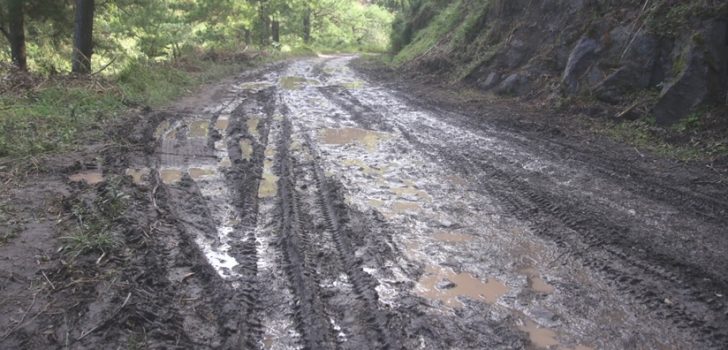 The rehabilitation of Besao-Nacawang FMR into an all-weather road shall link coffee production areas to the outside market. (Photo by Mabel Zabala)
The rehabilitation of Besao-Nacawang FMR into an all-weather road shall link coffee production areas to the outside market. (Photo by Mabel Zabala) PRDP approves road concreting project in Mountain Province to link coffee producers to the market
The long-awaited concreting of the rugged road traversing two adjacent municipalities, Tadian and Besao, Mountain Province finally sets off.
Director Lorenzo Caranguian said that the implementation for the subproject entitled “Improvement of Besao-Nacawang & Tadian-Mabalite Farm-to-Market Road Package I and II” shall set off by virtue of the “No Objection” letter No. 2 (NOL 2) issued by the DA PRDP NPCO dated January 6, 2017, signalling the awarding of the contract for Package I to Edison Development and Construction JV Upland and Engineering Services with project cost of P96,677,722.22 and to R.S. Sepian Construction and Trading for Package II with project cost of P102,507,925.59.
“Package I shall improve the Besao to Nacawang road with a 8.938 kilometer length, while Package II shall rehabilitate the Tadian to Mabalite road with a length of 11.772 kilometers,” said Engr. Noel Gallardo, assigned Rural Infrastructure Engineer of the PRDP Regional Project Coordinating Office. “Both are existing rugged roads,” Gallardo added.
The road project shall address the problem of poor access due to bad road condition resulting to high agricultural production and marketing costs, according to provincial reports. Moreover, the muddy road condition limits access to the production areas and hampers the development of potential/idle lands that could be cultivated for agro-forestry plantation of coffee, fruits, and highland vegetables which are the major crops in the project influenced areas of Besao and Tadian.
“The subproject aims to rehabilitate said roads into all-weather roads that shall connect the production areas of Besao and Tadian to the neighboring towns and markets within (Sagada, Bontoc, Bauko) and outside the province (Ilocos Region Cervantes, Baguio City)” said Ms. Lilly Rose Kollin, PPMIU Head of Mountain Province.
Kollin added that the concreting of the whole stretch encompasses mostly of gravel and mud, and shall directly benefit 14 barangays of Besao and 7 barangays of Tadian with around 4,270 households by the probability of increased traffic count, shortened travel time of commuters, reduced transport and hauling losses for agricultural products specially coffee, reduced post-harvest losses, and probable expanded coffee production sites. The road is seen to eventually help boost the economy of the said municipalities as well as that of the province.
“Adjacent municipalities like Sagada and Quirino, Ilocos Sur are indirectly benefited,” she said.
Coffee, the identified top priority commodity to be assisted under the PRDP, is the root cause of this proposed project. According to provincial reports, coffee production area in the sites has been recorded to contribute merely 9.64% of the agricultural land devoted to crop production which is estimated at 100.17 hectares only.
“There is a need to increase production area for coffee (in the Province),” Kollin added.
The province foresees that the improvement of said roads will possibly increase the production area with the utilization of the forest lands and the idle lands as it needs to increase over time with the possible intervention of the road project.
“Under the PRDP, rural infrastructures play a significant role in trying to provide the connectivity of the agri-fishery production sites to the processing and market centers within and outside the province. This is one of the mandates of the PRDP,” said Dir. Lorenzo Caranguian, Regional Project Director. “This shall directly enhance agricultural productivity and thus contribute to the food security and self-sufficiency programs of the Department of Agriculture,” he added. (Mabel Zabala, DA-PRDP InfoACE RPCO CAR)
